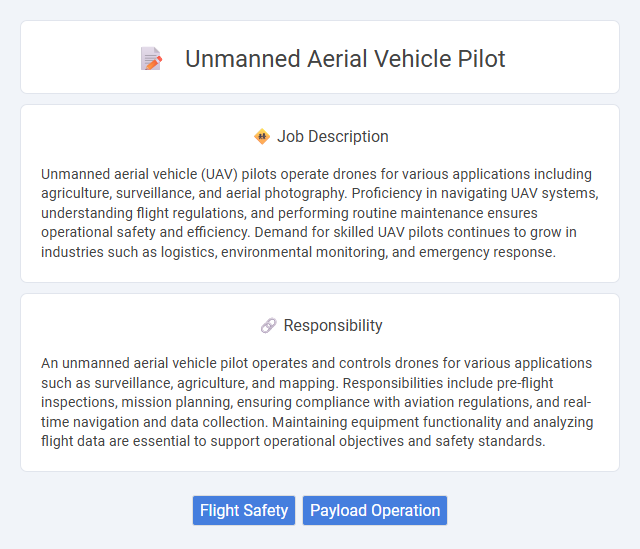
Unmanned aerial vehicle (UAV) pilots operate drones for various applications including agriculture, surveillance, and aerial photography. Proficiency in navigating UAV systems, understanding flight regulations, and performing routine maintenance ensures operational safety and efficiency. Demand for skilled UAV pilots continues to grow in industries such as logistics, environmental monitoring, and emergency response.
Individuals with strong spatial awareness, excellent hand-eye coordination, and the ability to remain calm under pressure are likely well-suited for a career as an unmanned aerial vehicle (UAV) pilots. Those who enjoy technology, possess quick decision-making skills, and maintain high concentration levels for extended periods may find the job fulfilling and manageable. People with anxiety disorders or difficulty focusing might face challenges adapting to the demanding conditions of this specialized role.
Qualification
A qualified unmanned aerial vehicle (UAV) pilot must hold a valid remote pilot certificate issued by the Federal Aviation Administration (FAA) or relevant aviation authority. Essential qualifications include comprehensive knowledge of airspace regulations, flight safety protocols, and proficiency in UAV operation and maintenance. Experience with specific UAV models and strong technical skills in navigation, communication systems, and data analysis enhance job performance and compliance with industry standards.
Responsibility
An unmanned aerial vehicle pilot operates and controls drones for various applications such as surveillance, agriculture, and mapping. Responsibilities include pre-flight inspections, mission planning, ensuring compliance with aviation regulations, and real-time navigation and data collection. Maintaining equipment functionality and analyzing flight data are essential to support operational objectives and safety standards.
Benefit
The role of an unmanned aerial vehicle (UAV) pilot likely offers significant benefits, including the potential for high demand in industries such as agriculture, logistics, and emergency response. There appears to be opportunities for remote work and flexible scheduling, which may appeal to those seeking work-life balance. Skill development in technology and data analysis is probable, enhancing career growth prospects.
Challenge
The role of an unmanned aerial vehicle (UAV) pilot likely involves navigating complex flight environments that require precise control and quick decision-making under pressure. Challenges may stem from unpredictable weather conditions, potential technical malfunctions, and strict regulatory compliance, which demand constant vigilance and adaptability. The job probably requires continuous skill development to keep pace with advancing drone technologies and evolving airspace rules.
Career Advancement
Unmanned aerial vehicle (UAV) pilots have significant opportunities for career advancement through specialized training and certification in areas like advanced drone operations, aerial surveying, and data analysis. Progression paths often lead to roles such as UAV operations manager, drone systems engineer, or remote sensing analyst within industries including agriculture, defense, and film production. Mastery of emerging technologies and compliance with evolving aviation regulations are critical for climbing the career ladder in this rapidly expanding field.
Key Terms
Flight Safety
A Unmanned Aerial Vehicle (UAV) pilot ensures strict compliance with aviation regulations and safety protocols to maintain safe flight operations. Key responsibilities include conducting pre-flight inspections, monitoring weather conditions, and maintaining situational awareness to prevent collisions or accidents. Mastery of emergency procedures and real-time communication with air traffic control enhances overall flight safety in UAV missions.
Payload Operation
Unmanned aerial vehicle (UAV) pilots specializing in payload operation manage and control the equipment carried by drones, such as cameras, sensors, and delivery mechanisms. Their expertise ensures precise data collection, aerial surveillance, or cargo transport by optimizing payload functionality and integration with the UAV's systems. Proficient payload operation enhances mission success across industries like agriculture, surveillance, and logistics by maximizing drone efficiency and safety.
 kuljobs.com
kuljobs.com